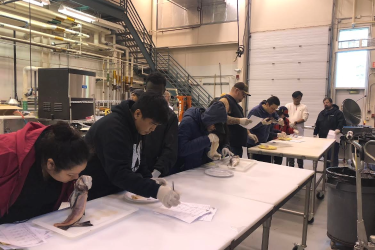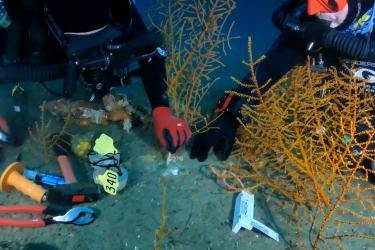What is your earliest fishing memory?
My earliest fishing memory is fishing with my dad and grandfather in small freshwater lakes around our neighborhood in Atlanta where I grew up. Bream were always plentiful and easy to catch, which helped keep my attention at a young age.
What is your favorite fishing memory?
My favorite fishing memory is very recent. In the late 1990s, I went to graduate school at the University of South Alabama. I studied red snapper and tagged thousands of fish. Most of the fish that I caught and tagged then were small and below the minimum size limit.
More recently, I had the chance to fish with colleagues and friends off Alabama for the first time since graduate school. I caught some really nice-sized red snapper. It was rewarding to see how much larger, and more abundant, the red snapper were after decades of work rebuilding this important fish stock.
What was it like taking your kids fishing? How has that experience influenced you?
I have taken both of my sons fishing. My oldest (21) does not share my love of fishing, because he wants the instant gratification of hooking a fish which is not always the case. My youngest son (19), on the other hand, really enjoys fishing and shares my appreciation for a relaxing, enjoyable day on the water catching fish and being with friends.
You enjoy fishing recreationally—does that help you engage with recreational anglers more effectively?
Absolutely. The Southeast region has more recreational anglers than all other regions of the United States combined. Recreational sportfishing is an important part of our culture, especially given the great weather we enjoy most of the year. Being a recreational angler helps me to relate and engage with other recreational anglers, and better informs the tough decisions I have to make as a voting member of fishery management councils.
How do you see recreational anglers getting involved in Southeast and Caribbean fisheries science and management?
I encourage recreational anglers to stay informed and get involved. One of the easiest ways to stay informed is by signing up for Council and NOAA Fisheries emails and social media. I also encourage anglers to provide comments at public hearings or fishery management council meetings, or join an organization that provides input to fishery managers.
If they want to get more engaged, then I recommend joining a Council advisory panel. And if they really want to get an in-depth look at federal fishery management, I highly encourage anglers to sign up for the Marine Resource Education Program. If they are more interested in science and research, there are lots of opportunities to conduct cooperative research and citizen science with state and federal fisheries scientists.
Most importantly, I encourage recreational anglers to offer new, innovative ideas to help manage our fisheries. Coastal population growth, increasing fishing effort, vast improvements in fishing equipment and technology, and climate change make it more difficult to manage our fisheries using traditional fishery management tools. Going forward, we will need new ideas and solutions to ensure the sustainability of our fisheries. Input from recreational anglers will be critical to help managers tackle those challenges.
How do you see climate change affecting Southeast and Caribbean anglers?
Climate change is already affecting the distribution of our fish species. Many of our fish species are extending their range farther north as water temperatures increase, and they may also be shifting to deeper, cooler water. Additionally, we are seeing changes in the productivity and recruitment of fish stocks, which is reducing the amount of fish that can be sustainably harvested. Climate change is also dramatically affecting corals through increased disease and bleaching, which in turn negatively affects fish that depend on coral reefs.
We are actively working to improve the climate readiness of our fisheries, including more than $20 million in Inflation Reduction Act funding for recreational data improvements. Similarly, along the Eastern Seaboard, we are planning for the future effects of climate change on our fisheries. We are conducting scenario planning, improving cross-jurisdictional governance across fishery councils, prioritizing data needed to manage in a changing climate, and better addressing uncertainty and increasing management flexibility.
What have been some of your favorite fishing trips?
Some of my favorite fishing trips don’t involve a fishing pole. Living in the Tampa Bay area, I take an annual trip to the Big Bend of Florida to go scalloping every summer. It is a great way to spend time with kids and close friends. I love captaining the boat and seeing the excitement of everyone snorkeling for scallops. Shucking the scallops is the least enjoyable part of the trip, but they always make for a great linguini dinner at the end of the day!


